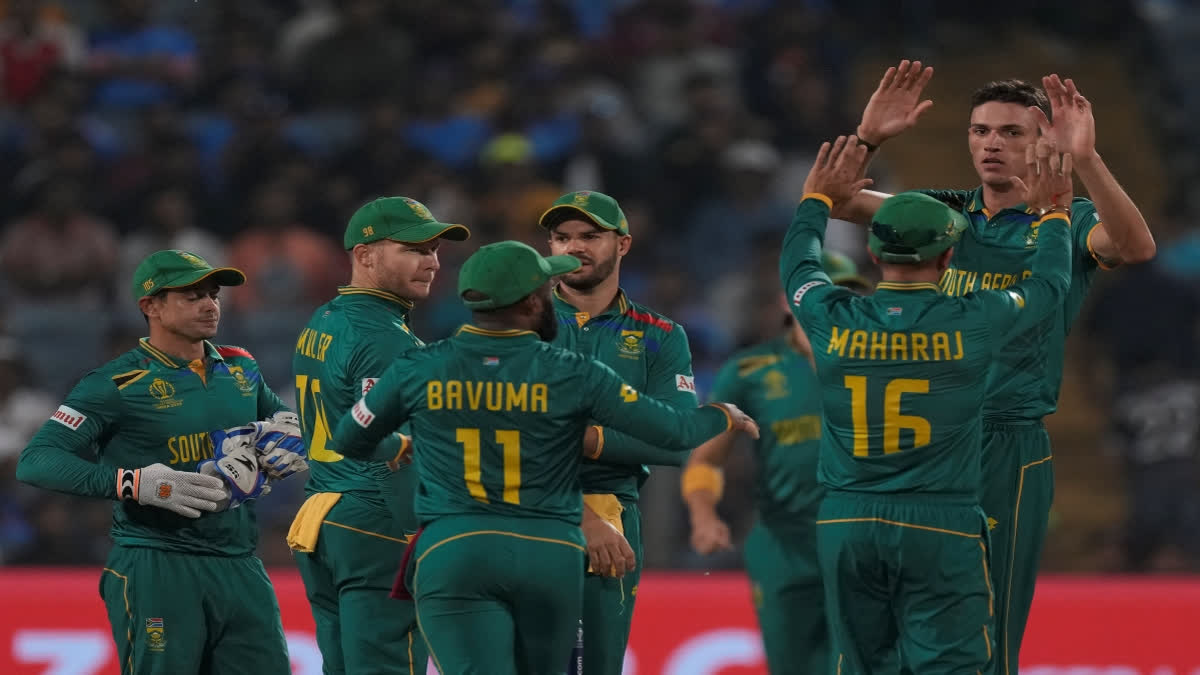Mumbai: Top of the table, highest run-getter, second highest wicket-taker, a record number of sixes, a red-hot form and the strongest bid ever to beat the proverbial jinx. It’s time to talk about what’s happening in the South Africa camp, a unit that has emerged as the one to beat, after India. South African wicket-keeper Quinton de Kock, a veteran of many glories, who is playing the last ODI tournament of his career, is on a song, giving the swan a melody to remember. With four centuries so far and the highest run-getter of the tournament with 545 runs in seven matches with a 77.85 per cent strike rate, Quinton de Kock has emerged as the master of the game for a team that serenades his mentoring even though he is not helming it.
For a guy, who has tired of one-day pressure, and who would much rather fish in the quiet stream crisscrossing his hometown back in the Rainbow Nation, de Kock has made quite a furious statement with his bat in his farewell World Cup. He is also the guy, who evoked worldwide anger after he refused to put one knee down to the campaign “Black Lives Matter” on grounds of conviction. But, playing for a Black captain Bavuma, and getting a bonhomie sheet from the mixed South African squad is a tribute that might soften his stance. Even if it doesn’t, his contribution will overshadow his prejudice, even though a scratchy 114 he delivered against New Zealand was the least of his four in this campaign.
Also read: World Cup 2023: Another riveting show awaits Wankhede, the vestige of cricket's memorable showdowns
Proteas batters hit 82 sixes in seven matches, 15 of them against a smarting New Zealand just the other day. South Africa are also doting on Marco Jansen, who has 16 wickets in seven matches, second only to Australia’s irrepressible Adam Zampa with an equal number, but in six matches. Jasprit Bumrah figures fourth with 14 wickets in six matches so far. The beauty of the South African campaign is the fact that Jansen has scalped as many as 14 in Powerplay.
South Africa is also A-listers for scoring the highest total of 428/5, derailing the Sri Lankan confidence at the Arun Jaitley stadium in New Delhi, setting their tone of serious contenders early in the tournament. South Africa, who meet India in what promises to be a smoking Sunday at Eden Gardens in Kolkata on November 5, are fresh from their thumping 190-run victory against New Zealand in Pune, a win that pushed India to the second position on the table.
Except for the bewildering and abject loss of 38 runs to minnows the Netherlands under the shadow of the snow-specked mountains at Dharamsala, the Proteas is building stories of brilliance in this World Cup. The workbook to a near unbreachable attack and defence has, on four occasions, been steered by centurion de Kock, who has announced he will retire after the World Cup.
As we all know, South Africa has never won the World Cup, despite big names and big performances. Their campaigns have been emotional and passionate entries singularly looking for the title, but all they have taken home are tags of chokers and jinxed masters, the latter often attributed to the apartheid regime at home, which fuelled a worldwide movement for its dismantling.
Though the Proteas has since dumped the Apartheid governments and brought in a Black and colour quota by rotation into their cricket team, the ultimate victory has eluded them consistently, mostly due to heartbreaking circumstances.
In 1992, when they could have qualified for their first final in their first World Cup appearance, the pre-Duckworth/Lewis rain rule had them ousted from the semifinals with the scoreboard showing an impossible 21 runs in 1 ball after they returned from the rain interruption. The same heartbreak echoed in Durban when Mark Boucher misread the instructions that were sent to him on a piece of paper.
Just needing one run from the last ball of the match against New Zealand, he did not run and skipper Shaun Pollock was distraught. A certain victory that was lost to a miscalculation. Then came the 2015 World Cup in Australia and New Zealand and the image of a sobbing AB de Villiers once New Zealand hit Dale Steyn for a six on the last ball, throwing them out of the tournament, refuses to quit public memory.
With five runs needed in two balls, New Zealand’s Grant Elliot belted Steyn to a massive six as de Villiers and Steyn broke down. Elliot shortened his celebration to console the South Africans, who fell one short of the final.
Not that 1999 was less heavy on the heart for them. In 1999, Lance Klusener failed to score nine runs in the last over when it was looking achievable. In desperation, he took a run where there was none, and South Africa was thrown out of the tournament. This one was adjudged as a match to remember for Hansie Cronje’s side, which fell to the only believable explanation of destiny.
But, 2023 looks like a new campaign with a renewed mindset, till now little left to destiny or destiny taking a break. Having said that, excruciating heartbreaks do not visit the Super Leagues. They are unexpected visitors of the knockout stages, and till now they’ve had a special kind of love for the men in green.
For now, the South Africans have informally reached the semifinals with just one bad day at work and are poised to meet the hosts to determine who is hot and who is hotter. So far, so good – so very good!
Also read: World Cup 2023: Can Afghanistan record a fourth win in World Cup when they take on the Netherlands?



